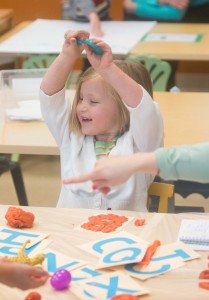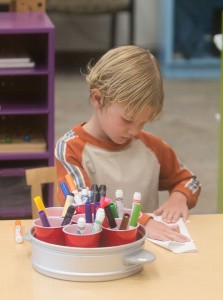
Kids’ giggles and screams of excitement can be heard on the BYU campus as students and faculty members walk past the west side of the Joseph F. Smith Building. Children climb the playground and run around during a game of tag before they return to the classroom for lessons and activities.
“We are not a daycare; we are an ‘educare,'” said lab Director Anne Ure. “It’s not just academics that we are teaching but social and emotional skills too.”
The Child and Family Studies research complex is located in Room 1100 of the JFSB and is home to BYU’s private preschool and kindergarten. Each semester the lab hosts 80 preschoolers and 40 kindergarten students. Students majoring in early childhood education have the opportunity to work in the school and gain hands-on experience.
Katie Leishman is an early childhood education major from Bellingham, Washington, who works in the kindergarten as a support teacher. Leishman makes sure everything is ready for the day and occasionally teaches lessons to the kindergartners.
“It’s the most amazing job, because it is already something that I want to do, and it helps me to get comfortable in a classroom,” Leishman said. “I look forward to the kids every day; they make me laugh.”
Leishman has worked in the lab for over a year and said she has learned a lot from the full-time teachers she works with.
“It’s a great opportunity for BYU students who want to go into early childhood education, because it is the perfect team of people,” Leishman said. “I’ve learned that to keep a class paying attention you need to be really exciting; you need to go all in.”
Ure has been the director for the past 16 years but said working with children was not her original plan. While Ure was completing her master’s degree she became the secretary of the center.

“I got the job because I needed the job,” Ure said. “Kids were not my emphasis. I majored in political science and got my master’s in public policy. I was going to go and lobby Congress.”
As Ure completed her master’s degree she was asked to fill the position of director for a year, as the original director had resigned. Ure began to learn the ropes of early childhood education with help from a faculty member.
“Children began to make sense to me,” Ure said. “They never came back to post the position, so I thought I better start learning all I could about human development.”
Ure began auditing classes and became a TA to gain knowledge about children and how to best run the center. She began to love the job and developed a passion for the work.
“I like my journey, because I can say to people who say they ‘don’t do children,’ if I can learn to do children, anyone can learn to do children,” Ure said. “I can understand where they are coming from, and I can share those simple tips and tricks that my mentors showed me that help so much.”
The center is a great tool for many students across disciplines at BYU, Ure said. Human development, psychology and the family and life sciences departments are some that have access to the center to conduct sttudies after they receive approval from the university IRB (Institutional Review Board for human subjects).
Students and parents can watch the children in their classrooms unnoticed by using the observation booth, a small room behind mirrored glass in each classroom.
“Parents can observe children and see where they are at, and students can come and learn from the teachers as well,” Ure said. “I instruct my teachers to go mamma bear and poppa bear on them if someone talks to the children though. The children need to feel safe, and the parents need to know they are safe.”
The kindergarten and preschool gives applicant priority first to full-time faculty and administration, then to full-time staff and finally to students before opening it up to the community as a whole. As parents fill out the application they are made aware of the studies that take place at the school. They are also given the opportunity to opt in and out of each research opportunity as it is presented, Ure said.
The school provides science, technology, engineering and math summer classes for children in the first through fourth grades. This 10-week program helps children learn about bridges, basic robotics, circuits and kitchen and science experiments.
“The classes are really full, and they fill up fast,” Ure said. “We started last year with six classes, and there was such a high demand that we added more.”
More information about summer classes and about the Child and Family Studies research complex can be found at https://preschool.byu.edu/Pages/Home.aspx.




